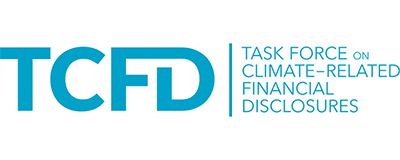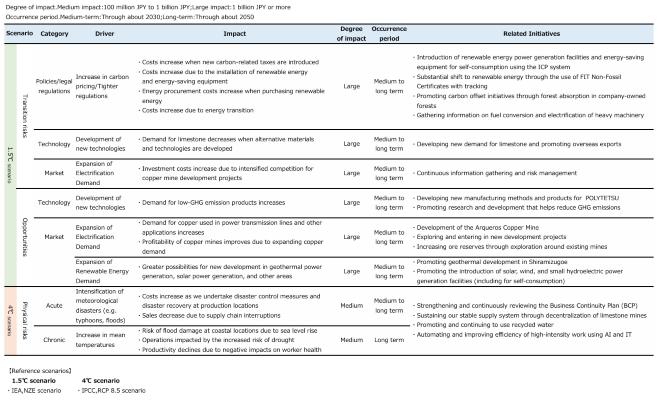Disclosure on TCFD Recommendation
- HOME
- Sustainability
- Environment
- Disclosure on TCFD Recommendation
Endorsing the TCFD Recommendations

With the recognition that addressing climate change is one of the most important management issues, the Group announced its endorsement of the recommendations of the Task Force on Climate-Related Financial Disclosures (TCFD) in June 2022. We aim to engage in sustainable business activities and improve our corporate value over the medium to long term by promoting initiatives to realize a decarbonized society.
Governance
Our Sustainability Committee—which is chaired by the President and comprises internal Directors and Corporate Executives as members—formulates policies, targets, and action plans for combating climate change and realizing other aspects of sustainability for the Group; manages and evaluates our progress toward the targets; discusses individual measures in depth; and reports and advises the Board of Directors on a regular basis. The Sustainability Committee has two regular meetings each year (in May and November) and holds extraordinary meetings as needed.
Strategies
We have conducted scenario analysis of 1.5°C and 4°C scenarios in order to identify risks and opportunities of the impact of climate change on each of the Group's businesses, and to examine measures to deal with them. We will continue to take relevant measures to reduce risks and seize opportunities.

Risk Management
After identifying climate-related risks and opportunities, the Sustainability Committee evaluates and reconsiders them through its consideration of responses and subsequent monitoring, and regularly reports significant risks to the Board of Directors. Additionally, in terms of efforts to achieve carbon neutrality, the committee discusses plans for reducing CO2 emissions, manages the progress of plan implementation, and takes necessary measures.
Indicators and Targets
The Group is making efforts to reduce CO2 emissions by steadily transitioning to implementing measures to combat climate change, including reducing fuel and electricity consumption by streamlining and switching to energy-saving facilities and introducing renewable energy-based power generation facilities and switching to renewable electricity for self-consumption. Specifically, we aim for a 38% or higher reduction *1 of energy-derived CO2 emissions from domestic Group companies' consumption of fossil fuels and electricity out of their total CO2 emissions—the sum of their direct (Scope 1) emissions and indirect (Scope 2) emissions from their use of electricity and other energy purchased from other companies—from the FY2013 level by FY2030, identical to the Japanese government's target for the corresponding CO2 emissions category.*2 Notably, we intend to further reduce non-energy-derived CO2 emissions from limestone calcination by working on carbon offsets through CO2 absorption in company-owned forests and introducing new technology for CCUS and the like once it is ready for real-world implementation.
We also plan to introduce new technologies and use carbon offsets and other means of achieving carbon neutrality to meet the long-term goal of reducing direct and indirect (Scope 1 and Scope 2) emissions of the Group's non-energy-derived CO2 by FY2050.
-
*1
38% or higher reduction from the FY2013 level:
The target rate of reduction for CO2 emissions derived from fuel and electricity consumed at plants and business locations under the Industrial category of the Japanese government's CO2 emissions categories -
*2
The Japanese government's FY2030 target for the corresponding CO2 emissions category:
The rate of reduction for the corresponding CO2 emissions category set out in the Comprehensive Plan of the Government under the Act on Promotion of Global Warming Countermeasures (approved by the Cabinet on October 22, 2021)

